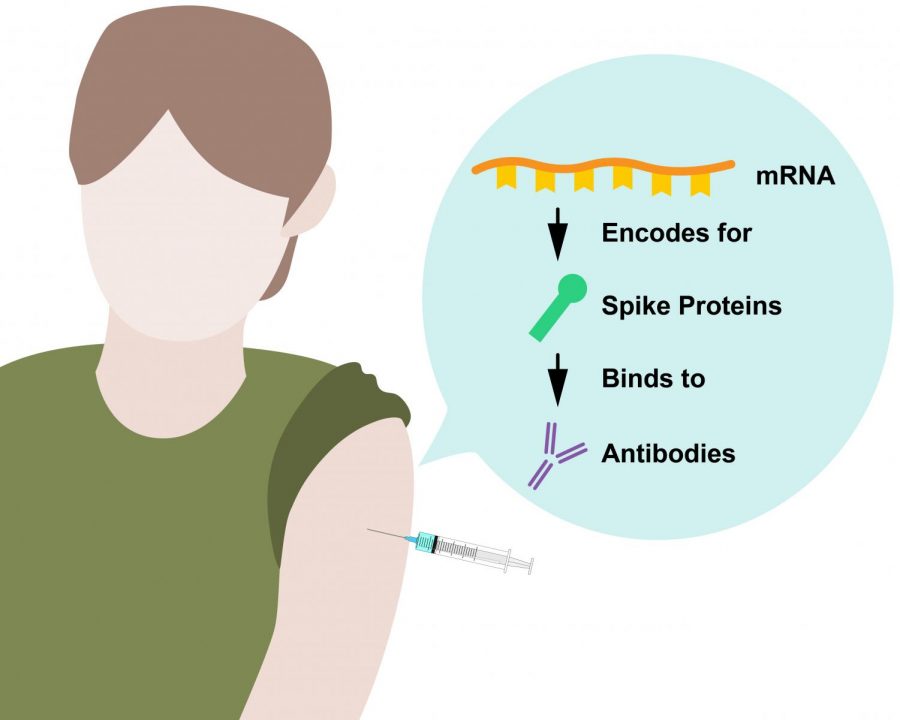Science Explained: What does a booster shot do for immunity?
Vaccines prepare body to fight off infection with strength; COVID-19 booster currently recommended for people who need it
mRNA from the COVID-19 vaccine is a set of molecular instructions. Cells use it to create SARS-CoV-2 spike proteins, which are not infectious. Then the body can make antibodies specific to the pathogen.
November 18, 2021
Booster shots for Pfizer and Moderna are approved for people with underlying conditions or those in high-risk settings. However, many people stumble across the same question: What exactly is a booster shot, and why do we need it?
Vaccines introduce a component of viruses or bacteria to the human body that help it learn to recognize the pathogen during a later infection, said Alan Goodman, associate professor in the School of Molecular Biosciences.
Once immune cells encounter a vaccine, they are reprogrammed to make antibodies specific for that virus or bacteria, Goodman said. Those immune cells will be ready to react, should the person be infected by the pathogen later on.
Some vaccines, like the flu shot, use inactivated or “dead” pathogens to stimulate an immune response, he said. The COVID-19 vaccine introduces viral mRNA to the body.
mRNA acts like instructions for the body to make proteins. When it comes from the vaccine, the body’s molecular machinery makes copies of the SARS-CoV-2 spike protein, said Nicole Rodin, assistant professor of pharmacotherapy in the WSU College of Pharmacy and Pharmaceutical Sciences. The spike proteins are not actually infectious, but they prepare the body’s immune cells to specifically fight the virus.
“[It’s] to make sure our body has all the tools to fight off COVID,” Rodin said.
The COVID-19 booster shot contains the same ingredients as the first, or priming, shot, Goodman said.
“Each time you get a shot, the best way to think about it is that your immune response to the pathogen you’re vaccinating against will become stronger and more specific,” he said.
Getting booster shots is like building muscle, Goodman said. During the off-season, an athlete will try to get stronger; however, during the season, they will just try to maintain that strength. With a booster shot, people are building immunity to a pathogen before the “season” — or infection from that pathogen — begins.
Having a strong and specific response to a pathogen limits the time that pathogen has to replicate and spread, he said.
Immunity is not always lifelong; many people experience waning immunity over time, he said. That is why some diseases require one or multiple booster shots to keep the body prepared for infection.
Some viruses — like influenza and coronaviruses — mutate rapidly. As the virus mutates, it can evade the immunity the body has developed to that virus, Goodman said.
As more people get vaccinated, the less the virus can spread and mutate, he said.
“We’re the ones that are generating these mutations because the virus is replicating in unvaccinated individuals,” Goodman said. “If you can have better strength and specificity of immune response, you can lower the chance that new mutants will be made.”
The booster shot may change to address new mutations that are circulating over time, he said.
Many people have likely had booster shots to prevent other diseases, Rodin said.
The measles, mumps and rubella vaccine can require booster shots, especially if there is an outbreak in a person’s area, she said.
Hepatitis A is given in a series of two shots for children with the second shot being the booster, according to the Centers for Disease Control and Prevention. The flu shot is also a booster shot because it works to get all immunity covered for the different flu variants.
At this point, booster shots are only being recommended to those who truly need it. This includes those who are 65 and older, Rodin said. Anyone in communal living such as a long-term care facility or anyone with an underlying health condition also has priority.
People with high-risk jobs like teachers, first responders, health care providers and food workers are prioritized to get the booster because they are working face to face with a variety of people, Rodin said.
Currently, anyone who is young does not have any underlying conditions or does not have a significant amount of face-to-face exposure is at lower priority to get the booster, she said.
Getting the COVID-19 vaccine is like being offered a free set of snow tires, Goodman said. It can be inconvenient to get it and there is a chance something could go wrong, but it can ultimately prevent a lot of bad things from happening.
People can schedule their flu shot at the same time as their COVID-19 shot, Rodin said. It is safe to get the two vaccines at the same time, but people should be prepared to feel sick afterward.












